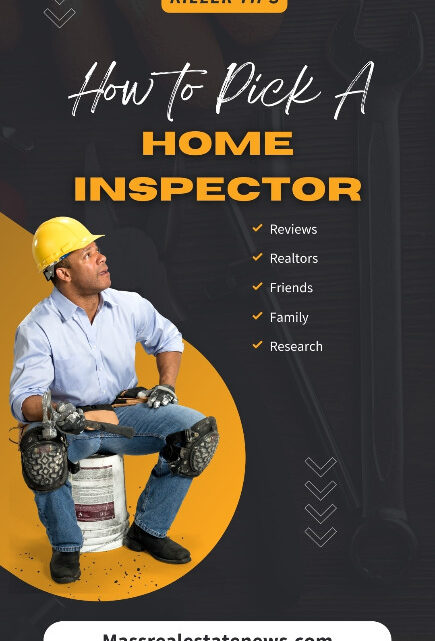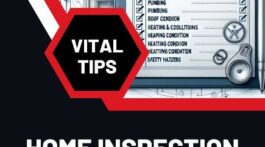Are you looking for an exceptional inspector for homes?
Finding the perfect dream home is step one, but how can you ensure it’s not a potential money pit? Bringing in an expert Massachusetts home inspector is vital. They can unveil hidden issues and assess the property’s structure, guaranteeing your new haven is disaster-free.
However, choosing the right inspector for homes in Massachusetts can be as daunting as house hunting. With countless professionals claiming to offer top-notch services, separating wheat from chaff may feel like a Herculean task.
Fear not!
We will provide a detailed guide with a user-centric checklist for selecting an ideal Massachusetts home inspector to safeguard your investment. Prepare yourself for a journey into the world of unmasking concealed property defects. You’ll ensure that what you see is indeed what you get!
Finding and selecting a reliable home inspector in Massachusetts is crucial when making such a significant investment. To locate a trustworthy inspector, consider reading online reviews, checking their social media presence, and asking for referrals from friends or real estate professionals.
It’s essential to ask the right questions about their inspection process, including whether they evaluate the roof, crawlspaces, and attic.
Additionally, ensure that their inspection reports are comprehensive and understandable. Taking these steps will help you make an informed decision. You’ll be able to choose a qualified home inspector who can provide valuable insights into the condition of your potential new home.
From decades of experience as a Realtor, selecting an excellent home inspector is a crucial consideration when buying a house in Massachusetts. A home inspector should never be chosen based on price, but by their experience, guidance, and expertise.
Let’s examine everything you need to know to make the best choice.
Researching Potential Home Inspectors in Massachusetts
Thorough research is vital when selecting the right inspector for homes. Exploring your options can help you choose a qualified professional who meets your needs. So, how should you go about researching potential home inspectors in Massachusetts?
Start by seeking recommendations from trusted sources such as friends, family, or real estate agents who have had positive experiences with home inspectors. Their insights can provide valuable guidance and help you narrow down your choices.
Next, take advantage of online resources. Check reputable websites that offer directories of certified and licensed home inspectors in your area. Reading reviews and testimonials can give you an idea of other homeowners’ experiences with the inspectors.
Additionally, consider checking social media platforms or online forums where people discuss their experiences and recommend reliable professionals. Remember to consider both positive and negative feedback when making your decision.
You’ll gain confidence in the potential home inspectors you’ve identified by conducting comprehensive research. You will be better equipped to make an informed choice.
Don’t listen to other sources online that say not to get a recommendation from your real estate agent. If you have a buyer’s agent you know and trust, you can expect them to give excellent advice. No – most Realtors don’t want their clients to have a lousy inspection.
While every industry has bad apples, most agents want what’s best for their clients.
Noteworthy Statistics
- The American Society of Home Inspectors (ASHI) states that only around 56% of all home inspectors are certified, underscoring the importance of diligent research in finding a proven professional.
- According to a survey by the National Association of Realtors, nearly four out of every five homes sold in the U.S. undergo a home inspection, highlighting how pivotal this process is for buyers.
- A report from ASHI also reveals that typical home inspections uncover an average of 7 areas needing repairs or attention. This statistic underscores the value good inspectors can provide in identifying potential problems.
Checking Licenses and Certificates
Before entrusting someone to inspect one of your most significant investments – your home – it’s crucial to ensure they are properly licensed and certified. So, what should you look for when checking licenses and certificates?
This information can typically be found on government websites or through professional organizations dedicated to the field. Ensure that any potential inspector meets these requirements.
To further validate their credibility, check if the inspector holds additional certifications or memberships with reputable organizations such as the American Society of Home Inspectors (ASHI) or the International Association of Certified Home Inspectors (InterNACHI).
Membership with these affiliations often indicates a commitment to high standards and ongoing education within the industry.
Remember that licenses and certifications vary by jurisdiction, so be sure to verify that they align with the regulations in your area. If you have any doubts, don’t hesitate to contact the inspector directly and ask for clarification or proof of their credentials.
Remember, working with a licensed and certified home inspector guarantees that they possess the knowledge and expertise to evaluate your future home thoroughly.
Assessing Experience and Specializations
When choosing an inspector for houses, assessing their experience and specializations is paramount. A good home inspector should be like a family doctor for your home, evaluating the whole property and recommending specialists when necessary.
Look for Massachusetts inspectors who have been in the industry for several years, which typically indicates their expertise and reliability. Additionally, inquire about any specific areas of specialization they may have. For example, some inspectors specialize in historic homes or new construction.
This ensures they have the knowledge and skills to inspect your potential new home thoroughly.
For instance, if you are considering purchasing an older home with intricate architectural details, finding inspectors for homes in Massachusetts with experience working with historic properties would be beneficial. They will understand the unique challenges that may arise during the inspection process.
Remember, though, that experience alone is not enough. Seek inspectors who actively participate in professional development programs and stay updated with industry standards, regulations, and new developments. This commitment to ongoing education demonstrates their dedication to providing high-quality inspections.
Now that we’ve discussed the crucial aspect of assessing experience and specializations let’s move on to another vital step in finding the right home inspector – evaluating the marketplace.
Evaluating the Marketplace in Massachusetts
The marketplace for home inspectors in Massachusetts can sometimes be vast and overwhelming. To narrow your options effectively, you must take a strategic approach to evaluating the marketplace.
Begin by seeking recommendations from friends, family members, real estate agents, or other trusted sources recently going through the home-buying process. Their firsthand experiences can help guide you toward reliable professionals.
In addition to personal referrals, don’t forget to leverage online resources. Conduct searches on review platforms like Google or Yelp to read reviews from previous clients regarding their experiences with various inspectors.
Pay attention to overall ratings and specific feedback about their professionalism, thoroughness, and communication skills. A well-established online presence indicates the inspector’s commitment to their business.
For example, suppose you come across an inspector with consistently positive reviews highlighting their attention to detail and clear, concise reporting. This indicates they will likely provide a comprehensive inspection report you can understand and utilize throughout home-buying.
Remember, don’t make your decision solely based on price. While the cost of a home inspection is undoubtedly a factor, selecting the cheapest option may not always guarantee the best quality service.
It’s worth investing in a reputable and experienced home inspector to ensure a thorough assessment of your potential new home.
Now that we’ve covered the importance of evaluating the marketplace, let’s explore another critical aspect of finding the right home inspector – seeking recommendations and reading reviews.
Seeking Recommendations and Reading Reviews
When embarking on the journey of finding the inspector of homes, seeking recommendations and reading reviews should be your initial step. Just like when searching for a trustworthy doctor or mechanic. Gathering trusted people’s feedback, insights, and references is essential before deciding.
Start by contacting friends, family, and colleagues who have recently purchased a home. Ask about their experience with a home inspector. Good or bad, their recommendations can offer valuable guidance.
Additionally, take advantage of online resources to read reviews and testimonials about different home inspectors in your area. As mentioned, websites like Google, Yelp, or even social media platforms can provide helpful feedback from previous clients.
Pay attention to recurring themes in the reviews – is there praise for thoroughness, professionalism, or communication skills? Or are there red flags signaling a lack of attention to detail or poor customer service?
These insights will help you streamline your choices and make an informed decision.
Critical Questions for Your Prospective Massachusetts Home Inspector
Once you have compiled a list of potential home inspectors based on recommendations and reviews, it’s time to evaluate them further through direct contact. Prepare a set of key questions that will allow you to gauge their expertise, qualifications, and process.
Here are some critical questions to consider:
Get Answers to Crucial Questions
- Do you walk the roof? A thorough home inspection should include roof evaluation unless it’s steep or delicate. Walking the roof allows for a comprehensive assessment of its condition.
- Do you crawl the crawlspace? If your prospective home has a crawlspace, it’s vital that the inspector physically goes inside. This ensures potential issues are not overlooked.
- Do you go into the attic when there is no room to walk? Attics can reveal hidden problems, such as insulation issues or signs of water damage. Confirm that the inspector includes this area in their evaluation.
- Do you use thermal imaging? Thermal imaging can detect hidden issues such as insulation gaps or water leaks. It’s an advanced technique that adds an extra layer of analysis to the inspection process.
- How long do your inspections typically take? Understanding the duration of the inspection gives you a sense of how thorough and detailed it will be. Be wary of inspectors who rush through the process.
- Do you remove electrical panel covers? Checking the electrical panel is crucial for assessing its condition and identifying potential hazards. Ensure that this step is included in the inspection.
- Are there any appliances you don’t inspect? Home inspectors may exclude certain appliances, such as washing machines and dryers, from their evaluation. Clarify which appliances will be inspected to avoid surprises later on.
Remember, a good Massachusetts home inspector should answer these questions confidently and encourage you to walk along with them during the inspection. This offers an opportunity to learn more about your prospective new home and ask additional questions.
Post-Selection: Next Steps with Your Chosen Home Inspector in Massachusetts
Congratulations! You’ve gone through the process of selecting a home inspector and have made your choice. Now, it’s time to take the following steps in working with your chosen professional to ensure a thorough inspection and maximize this opportunity.
Once you have finalized your selection, reach out to your home inspector and schedule an appointment at a convenient time for both parties. Being present during the inspection is essential to participate and ask questions actively.
Remember, good inspectors for homes will allow you to walk with them during the inspection. Doing so will provide valuable insights into the condition of your potential home.
On the inspection day, arriving on time and being prepared is essential. Ensure you have a list of questions or concerns you’d like the inspector to address. This is your chance to gain as much knowledge about the property as possible. Don’t hesitate to inquire about particular areas of interest or potential issues.
Pay close attention to what the home inspector does and says during the inspection. Take notes if needed, and don’t be afraid to ask for clarification if something is unclear. A reputable Massachusetts inspector will explain and offer recommendations for further evaluation if necessary.
Review The Inspection Report Carefully
Once the inspection is complete, you’ll receive a detailed report outlining their findings. Take the time to carefully review this report, making note of any significant defects or issues that require further attention. If specific areas are mentioned in the report that you’d like more information on, don’t hesitate to contact the inspector for clarification.
Following up promptly is crucial if repairs or additional inspections are recommended based on the findings. Seeking professional advice from contractors or specialists can help you make informed decisions about potential repairs or negotiation strategies with sellers.
For instance, if the home inspector identifies an electrical system issue requiring further evaluation by an electrician, reach out to a reputable electrician and schedule an appointment. Their expertise can give you a better understanding of the scope and cost of repairs. It will enable you to make informed decisions moving forward.
Focus on What’s Most Important
Don’t get caught up in the minutia when viewing the home inspection report. Focus on vital things that need addressing. Look for items that impact safety, violate the building code, and have structural and mechanical problems.
Part of the home inspection process will be determining what needs immediate attention. You can then get back to the seller with your requests. It will give you peace of mind that the most essential things are addressed.
Use your home inspection contingency, if necessary, when the seller isn’t willing to cooperate. Your Realtor should be able to help you put together a home inspection checklist of what’s a reasonable request.
The bottom line is ensuring your home purchase is a wise one.
Always remember that a home inspection is a visual assessment with limitations. While a good inspector will do their best to uncover any possible defects or issues, there may still be hidden problems that are not immediately apparent.
However, you’ll be better equipped to make informed decisions about your potential purchase by working closely with your chosen home inspector.
Remember, one of the essential parts of homeownership is a quality inspection. Hopefully, these tips will help you find and hire the best inspector.
FAQs
Here are some common questions with answers that potential home buyers often ask.
What Does a Massachusetts Home Inspector Do?
A home inspector is a trained professional conducting a thorough examination of residential properties to assess their overall condition and identify potential issues or defects.
Their primary objective is to objectively examine the property, ensuring buyers comprehensively understand its structural integrity, safety features, and functionality.
Home inspectors meticulously examine various aspects of the property, including the foundation, roof, electrical systems, plumbing, HVAC systems, and more. They can also provide testing for items such as radon, mold, and asbestos. Their job is to leave no stone unturned.
They utilize specialized tools and techniques to detect hidden problems such as mold, termites, or structural weaknesses. By providing detailed reports and recommendations, home inspectors play a crucial role in helping individuals make informed decisions when purchasing or selling a home.
What Qualifications Should I Look For?
When selecting an inspector for homes, it is crucial to consider their qualifications to ensure a thorough and accurate property assessment.
Look for inspectors who have obtained certification from reputable organizations such as the International Association of Certified Home Inspectors (InterNACHI) or the American Society of Home Inspectors (ASHI).
These certifications indicate that the inspector has undergone rigorous training and testing to meet industry standards. It is beneficial to choose a Massachusetts inspector with a background in construction or engineering, as their expertise will enable them to identify potential issues more effectively.
Lastly, inquire about their experience and request references from previous clients to gauge their professionalism and reliability.
How Long Does a Typical Inspection Take?
A typical home inspection usually takes around 2 to 3 hours. However, the duration can vary depending on various factors, such as the size and complexity of the property, the number of systems being inspected, and any specific concerns or issues that need to be addressed.
The inspector meticulously examines each area of the house, including the exterior, interior, electrical systems, plumbing, HVAC systems, and structural components. They also take time to document their findings and provide detailed reports for the homeowner.
While some inspections may be completed in less time for smaller properties, it is essential to allocate sufficient time to examine all aspects of the home thoroughly.













No Comment